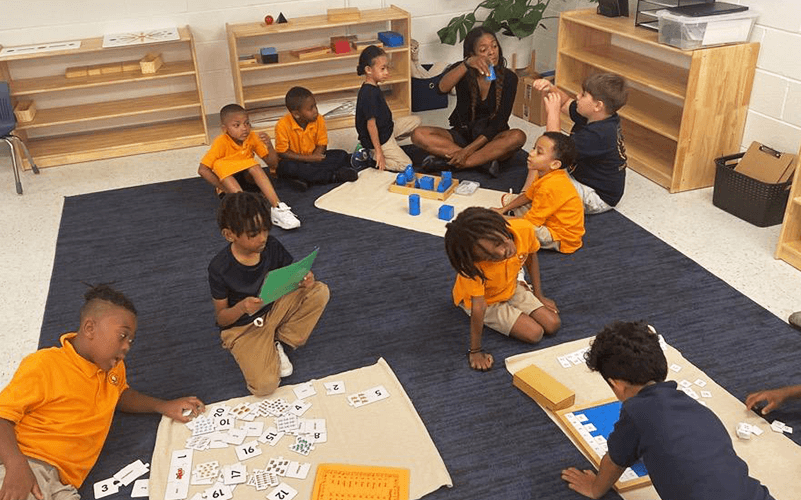Is a Tuition-Free Montessori School Right for Your Child?

For many parents, the benefits of Montessori education are obvious: child-led learning, hands-on experiences, independence, and a strong sense of responsibility. But the high cost of private Montessori programs can make this method seem out of reach—especially for families seeking quality education on a budget. The good news? There is a growing movement across the U.S. toward tuition-free Montessori schools, opening doors for more families than ever before.
If you’re looking to give your child the Montessori advantage without the private school price tag, here’s what you need to know.
What Is a Tuition-Free Montessori School?
A tuition-free Montessori school offers an authentic Montessori education at no cost to families. Most often, these schools are:
-
Public charter schools
-
Magnet schools with a Montessori focus
-
Public schools with Montessori classrooms
-
Non-profit organizations offering Montessori programs through grants or state funding
Unlike private Montessori schools, which charge tuition, these schools are funded by local or state education budgets—making them accessible to a broader and more diverse range of students.
How Is Montessori Different from Traditional Education?
Montessori education, developed by Dr. Maria Montessori in the early 1900s, emphasizes hands-on learning, independence, and freedom within limits. Instead of rote memorization or one-size-fits-all instruction, Montessori students:
-
Choose tasks based on their interests
-
Learn at their own pace
-
Collaborate across age groups
-
Work with specially designed materials
-
Are guided by trained Montessori educators (often called “guides” instead of teachers)
This model fosters independence, problem-solving, emotional intelligence, and a love of learning—qualities often overlooked in conventional classrooms.
What to Expect from a Tuition-Free Montessori Program
Although free, these schools are held to state and district education standards. Many operate as public charter schools, meaning they must meet specific academic and operational benchmarks.
In a tuition-free Montessori school, you can typically expect:
-
Mixed-age classrooms (e.g., ages 3–6, 6–9, 9–12)
-
Hands-on Montessori materials (math beads, pink tower, movable alphabet, etc.)
-
Emphasis on social-emotional development
-
Long, uninterrupted work periods (2–3 hours)
-
Minimal use of worksheets or textbooks
-
Certified Montessori educators
Some schools may blend traditional curriculum with Montessori methods, so it’s important to ask how strictly the school follows Montessori principles.
Who Should Consider a Tuition-Free Montessori School?
Families from all walks of life benefit from tuition-free Montessori programs. They’re ideal for:
-
Parents who want a more personalized, hands-on approach to learning
-
Children who thrive in a structured-yet-flexible environment
-
Families seeking an alternative to traditional public schools
-
Households that may not have the budget for private education
-
Communities looking for culturally responsive and inclusive pedagogy
Tuition-free Montessori programs are also a great fit for multilingual families, neurodivergent learners, and children with a strong sense of curiosity and independence.
Where Can You Find Tuition-Free Montessori Schools?
The number of tuition-free Montessori schools is growing, especially in urban areas and regions with strong charter school networks. Some states and cities even have entire districts or zones dedicated to Montessori education within the public system.
You can start your search by:
-
Visiting your state or district’s charter school directory
-
Searching “tuition-free Montessori school near me” online
-
Contacting Montessori advocacy organizations (like the National Center for Montessori in the Public Sector)
-
Asking local parent groups or forums for recommendations
Remember to tour schools, attend info sessions, and speak directly with staff to ensure the program aligns with Montessori values.
Challenges and Considerations
While tuition-free Montessori schools are a wonderful opportunity, they’re not without challenges:
-
Limited enrollment: Spots are often filled through lotteries, so early application is key.
-
Inconsistent fidelity: Not all public Montessori schools follow the full method strictly, especially if staff aren't AMS/AMI certified.
-
Funding variability: Because they rely on public funding, resources may not always match those of private Montessori schools.
-
Transportation or location issues: Families may need to travel further than to their local public school.
Still, the benefits often outweigh these concerns, especially when cost is a significant factor.
The Montessori Movement Is Becoming More Inclusive
Access to quality Montessori education has long been limited to families who could afford private tuition. But today, with tuition-free Montessori schools opening in underserved areas, more children are gaining access to the kind of nurturing, individualized education that builds lifelong learners.
By choosing a tuition-free Montessori school, you’re not only giving your child the chance to learn in a deeply respectful and empowering environment—you’re also part of a growing movement to bring educational equity and innovation to communities everywhere.








